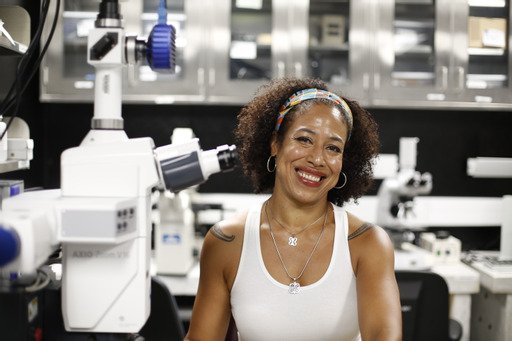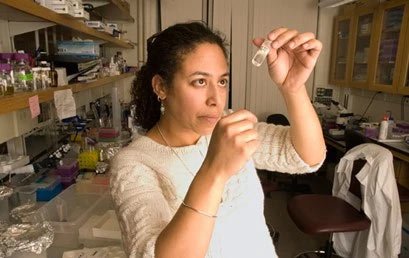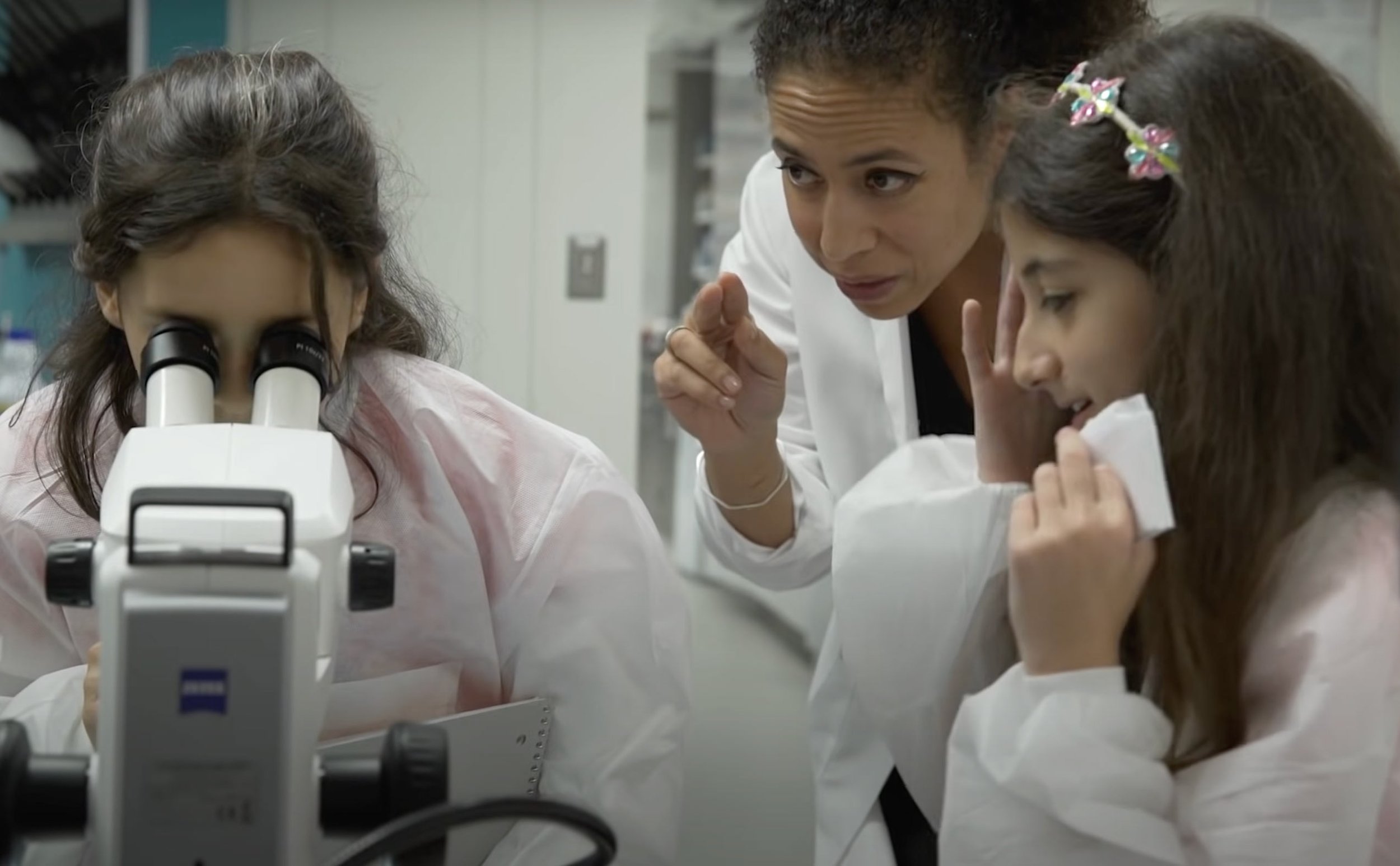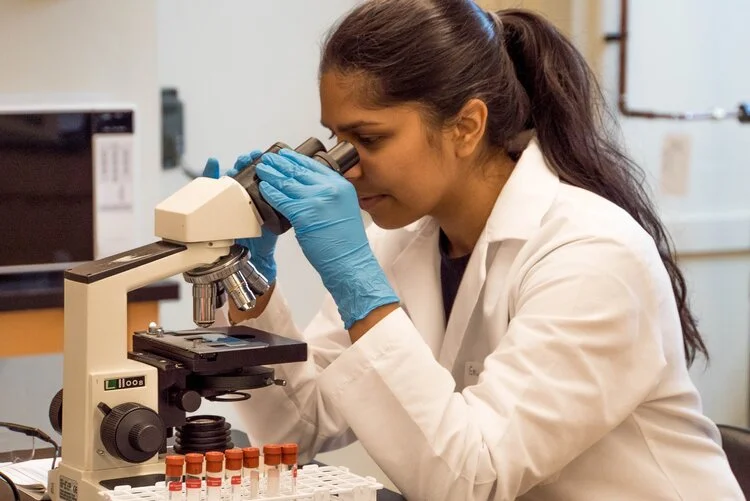I am a
Developmental
Biologist
At HarvardCassandra Extavour, PhD
This scientist was part of our original collection.*A few features may be different.
Cassandra
Extavour
She/her
“People can achieve great success in things, but that doesn’t mean everything comes easily to them.”
What does a young girl who spent most of her youth dancing, singing, and baking decide to do when she grows up? Well, in some cases, she becomes a dancing, singing, baking Biologist.
Dr. Cassandra Extavour didn’t always want to be a scientist. Microscopes and whiteboards seemed to have little to do with the vibrant world she grew up in. Raised in the Caribbean community of Toronto, her childhood was filled with family, music, food, and social activism.
A born performer, it wasn’t until high school that other parts of her personality demanded attention. She excelled in math and science, leading her to consider options outside of her comfort zone.
But realizing what you want doesn't mean it's going to be easy.
She worked full-time to pay her way through school, oscillating between satiating her curiosities and her passion for performance. When she stumbled across developmental genetics, the question of how we came to exist as we do became a compelling force. Of course, as a trailblazing queer woman of color in STEM, the challenges of finding elusive answers to scientific questions was - at times - eclipsed by the challenges of an institution that reflects the long-held biases of its society.
Today, she is living proof that we don’t have to choose between the parts of ourselves that matter. She is a proud and celebrated scientist, an inspiring performer, and an advocate for dismantling the barriers that she overcame.
Notable Accomplishments:
PhD in Genetics from Universidad Autonoma de Madrid
Ellison Medical Foundation New Scholar in Aging Award
The
basics:
Expertise: Developmental Biology; Genetics
Title: Professor
Institution: Harvard Department of Organismic and Evolutionary Biology; Harvard Department of Molecular and Cellular Biology
I am a singing, dancing Harvard biologist who wants to understand where we came from.
things I love:
SOCIAL ACTIVISM
•
SCI-FI MOVIES
•
SALSA DANCING
•
SINGING CLASSICAL MUSIC
•
COOKING
•
BAKING
•
SOCIAL ACTIVISM • SCI-FI MOVIES • SALSA DANCING • SINGING CLASSICAL MUSIC • COOKING • BAKING •










WHAT I DO
i am a Developmental Biologist
I study crickets to learn about genetics.
I run a lab.
I am a professor at Harvard University where I run a lab filled with white boards, microscopes, petri dishes, and lots of cages and containers.
I study bugs.
I study crickets, spiders, and other bugs to better understand how some of our most important cells behave.
I look at animals’ reproductive systems for clues.
I explore how single cell organisms led to the evolution of complex organisms with countless different types of cells.
MY WHY
I discovered developmental genetics (evolutionary biology) in college while trying to learn about the brain.
I want to know:
How do humans and other living things work?
And how did we get that way?
MY ADVICE
a little about me
I was the first Black, queer woman in many of my labs.
I am a classical singer. I worked at McDonald’s to pay for school. I wanted to be a pastry chef as a kid. I love to salsa. I also often overthink things.
MY PATH TO SCIENCE
Lively Childhood
I was born in Canada but have roots in Trinidad. I had a diverse childhood filled with music, art, food, activism, and lots of family. I learned about my cultural roots alongside other immigrant families in Toronto during the popular Caribana Toronto. As a child, I wanted to dance, sing and bake and had little early interest in science. I came to science accidentally after acing a math test in high school.
Worked through School
I decided to go to college but I needed to pay for it myself. I had part-time jobs starting in high school — working at the library, McDonalds’s, and as a secretary. In college, I took my first genetics class and was hooked. I wanted to study the brain but didn’t really know a lot about research. I discovered developmental biology while trying to learn about the brain.
Moved to Spain to Study
I attended graduate school in Spain where I became the first woman in my research lab. I overcame racism and sexism to pursue my science. I decided to focus my research on evolution and learned how to apply genetics to the questions I was interested in.
Continuing to Learn
After graduating with my PhD in Genetics, I moved to Greece for my post-doctorate training. I continue to publish research and have become a leader in my field. I also continue to look for opportunities to participate in social justic action for causes in support of the LGBTQ community, feminism, women of color, and Carribbean women both within and outside of science.
Becoming a Professor
After Greece, I moved to Cambridge, MA to become a professor at Harvard University. Now I run a lab where students come from all over the world to learn from me and become scientists. I am committed to making science a better place for everyone by examining cultural bias in science and labs.
I study Developmental Biology
Developmental biology is the study of how genes control cells as they grow and change.
INTRODUCING
Genetics
What is genetics? Why does it matter?
How did we come to be the way we are? What makes a cricket baby turn into a cricket? How do we develop successfully from mere bundles of cells into large, multi-functional organisms? How are traits, like hair color or height, passed on from parent to offspring? The study of genetics tackles these questions and more, and has become one of the most complex fields of science today. And it all started with a couple of pea plants.
In the 1800s, an Augustinian friar named Gregor Mendel kept a garden. By carefully planting new pea plants from specific parent seeds generation after generation, he noticed that traits like seed shape and flower color seemed to be passed down from the parent plants to the offspring plants in “units of inheritance,” which we now understand as “genes”. From his simple garden experiments, he even understood that some genes were “dominant” and some were “recessive” meaning that when plants inherited one of each type from each parent plant, the dominant gene would be the one that was displayed in the offspring. These ideas now form the basis of the field of genetics, which seeks to understand how thousands of genes — encoded in our DNA — in any given organism interact with influences from our environments to produce the plants and animals that we see all around us.
The applications of this very broad field are endless. Some geneticists study humans, some study plants, some study viruses. Some us computers, others use animal models, and others use samples from people. The impact of this work is just as far-reaching. The study of genetics can help us with everything from making improvements to our food to improving medical treatments to better understanding our bodies, behaviors, and even evolution as a species.
Career Resources
Every scientist’s path is unique, and the right resources can make all of the difference. Below are a selection of resources that may be helpful for those who are interested in areas of science that are related to Cassandra’s work.

“You can know whatever you want. All of the information in the world is there for you. You just have to ask somebody, somebody will teach you, you can read about it, and then you will know things that you didn’t know before. And that’s what you need to be a scientist.”
— Cassandra Extavour, PhD
KEEP EXPLORING
Here are some resources we recommend for diving deeper into themes from this story.
Medical & Health Sciences
FIELD GUIDE
coming soonView more related scientists:
Looking for teacher resources?
PHOTOGRAPHER: Erica Derrickson • Boston, MA© 2024 THE PLENARY, CO. ALL RIGHTS RESERVED. TERMS. PRIVACY.This is a brand new site! See an issue? Let us know.















